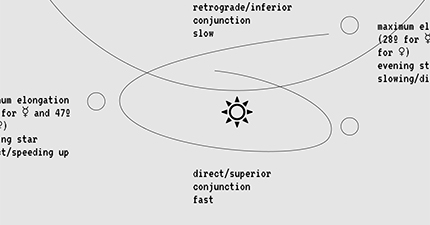Firmicus calls the seventh house Dysis, who was goddess of the sunset. The seventh house is a deeply yellow house where all things come to rest. It’s the putting away of things for the day, of wheels that stop turning and hands that stop working. It’s the first house counting clockwise from the ascendent that hovers over the horizon.
There are breakages associated with the seventh house, which we profect from when we are eighteen and then thirty and then forty two and then fifty four and on.
Sunset is a break in the day. It’s when some of us go home from work and try to do the exhausting task of preparing a night time meal. It’s when some of us go catch a night shift and find ourselves trying to wake up with strangers. It’s rush hour.
In this same way, seventh house profection years are interruptions. They tend to coincide with a Jupiter opposition, which is about finally having the perspective that you need to notice what you started six years ago. There can be a sense of starting anew, from scratch, in the seventh house.
The seventh house is not the house of love, which belongs to the fifth house. The seventh house is the house of those who know us and those who we know. It’s the house of relationship building and it does not discriminate between the types. The seventh house knows only exchange, not classification.
The seventh house is where we reflect on what we know and how we know it. It’s the house where we are able to notice what we began six years ago when we were in the first house. It’s where self assessment happens and where we’re forced to come to have more empathy for ourselves than we ever knew before.
You see, the seventh house is not just the house of partnership. It’s the house that opposes your ascendent. It’s the house of difference that Audre Lorde writes about—the house where we seek freedom with and from what was given to use to define ourselves with. It’s the house where we try to create understanding out of identity.
The Seventh House Changes
Traditionally, the seventh house is meant to be about marriage in the first phase of life, conflicts and enemies in the second, and business partnerships in the third. I like to call the seventh house the house of social identity. It’s the house where we learn how to communicate who we are to other people.
Truth be told, I don’t see the seventh house as being about partnership. Very rarely do I get a client going through a seventh house year dealing mostly with issues of partnership. It happens, sure, but not nearly common enough for me to feel that partnership defines the seventh house.
Instead, I do see people who are going through breaks with their own identity when they move through the seventh house. I talk to people who are moving, changing their goals, and enjoying a certain kind of perspective about who they are and who they want to be.
I think that the question that the seventh house asks of us is less a question of marriage and more a question of “what do you mean to your wider community?”
In the first phase of life, we get seventh house years at seven and eighteen. These are big years. They coincide with the opening Saturn square that concludes when Saturn returns during another seventh house year and a nodal return. Then, we get seventh house years at thirty, forty two, and fifty four in the second phase of life. I don’t have a ton of clients who are post second Saturn return. I wish I did but I don’t. I don’t know too much about how seventh house years look beyond that second Saturn cycle.
There is a sense of putting things away during seventh house years. There’s a feeling of putting away old things, of throwing things out, and of cleaning things up. There’s also a seriousness there. These are years during which we make actual changes and not plausible dreams. We take hope seriously during seventh house years, knowing that every dream constitutes an exact level of decisions. We don’t have so much time or room for fancifulness during these years.
The Luminaries
The co-signifiers of the seventh house happen to be the Sun and the Moon. It’s supposed to change based on gender, where a man is supposed to look at his Moon for information about his seventh house and a woman is supposed to look at her Sun for information about her seventh house but, again, we’re not going to be looking at the seventh house in the context of marriage. I just don’t see enough evidence of that holding up.
I do think that the seventh house has to do with us trying to become ourselves. It’s not about who we are now but about the people who we could, possibly, become. It’s about who we decide to become. There is an aspect of decision making in the seventh house. That is why the luminaries have to do with the seventh house. The luminaries have to do with self becoming.
As much as the seventh house has to do with growing up, it also has to do with growing into yourself. The luminaries are childish planets. The seventh house is when we find our biggest personality changes and sometimes these changes have as much to do with growing younger than they have with growing older.
Lastly, there is also an aspect of self consciousness with the seventh house. It’s a house in which we realize ourselves. The seventh house years tend to be times in which we get more attention, the seventh house having to do with visibility over the horizon. “That’s who I am! That’s who I have been all along” is a seventh house kind of epiphany. And then, awkward-limbed, we have to learn how to move without thinking once again.
Working with the Seventh House
Because the seventh house has to do with big life changes and active decision making, control is a part of the seventh house. We tend to make the decisions that create these domino-like effects in the seventh house—decisions that affect not just ourselves in the here and now but other people and ourselves in the future. It’s when we pick and choose our future selves.
There are things that we are in control of and there are things that we aren’t in control of. A lot of the time, making big decisions brings out a kind of anticipatory homesickness. Big decisions are scary. We tend to forget that we are allowed to change our minds. The seventh house is a threshold and entering it means that we have this sensation of never looking back.
What helps the seventh house is the reminder that you never really lose the person you have always been, the reminder that you will always look up and see the same moon that your friends back home see, and that big changes take time. If you’re uncomfortable at first, it doesn’t mean that you made the wrong decision. It might just mean that you’re finding out how your edges feel in a new trajectory.
There’s also the issue of looking back at the seventh house in post. These are the years during which we make our most monumental choices and the responsibility of choice means that, sometimes, we find ourselves in a kind of hindsight bias where we wish we had the information we have now to remake the decisions we made yesterday. It’s important to remember that your past decisions, those very big changes, are the things that exposed you to new information in the first place.
The seventh house is a challenge—there’s no way of getting around that. This is the house of self confrontation. We call on ourselves in the seventh house, sometimes scolding ourselves into shape. We remind ourselves of the things that we’re supposed to be doing that we haven’t been doing. We feel a sense of urgency in the seventh house.
But the seventh house, being a threshold, is just what welcomes you into the upper skies. We’re moving above the earth now and looking up. We have time to figure things out. We don’t have to make every decision right away and we don’t have to feel comfortable in our decisions right away. It’s just a door that we are thrust into, not always welcomingly, by the passage of time.


